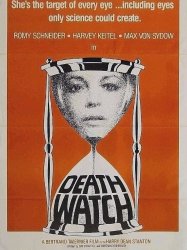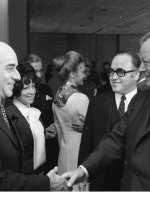Géza von Radványi is a Director, Scriptwriter, Producer and Editor Hongrois born on 26 september 1907 at Košice (Slovaquie)

200px
Géza von Radványi (26 September 1907 – 27 November 1986) was a Hungarian film director, cinematographer, producer and writer.
He began at the end of the 1940s, with Valahol Európában and Donne senza nome, neorealist dramas with no concession to the ravages of war and the postwar period. During the 1950s, von Radványi changed his style: L'Étrange Désir de monsieur Bard, with Michel Simon and Geneviève Page (1953), and, above all, the success of his remake of Mädchen in Uniform with Lilli Palmer, Marthe Mercadier and the young rising star, Romy Schneider (1958). He also made in the same decade Ihr Verbrechen war Liebe, a thriller based on a script by Boileau and Narcejac, with Lino Ventura and Laurent Terzieff, as well as a slapstick comedy, Ein Engel auf Erden with Romy Schneider and Henri Vidal (1959).
During the 1960s, he became both more ambitious and more bankable, making 70 mm coproductions like, Onkel Toms Hütte with Mylène Demongeot and Herbert Lom (1965), and Der Kongreß amüsiert sich with Lilli Palmer, Curd Jürgens, Paul Meurisse and Françoise Arnoul (1966), both of which were rather unsuccessful.
In contrast, he surprisingly wrote the script for the successful film produced by Louis de Funès, L'homme orchestre, directed by Serge Korber (1970). His 1961 film Das Riesenrad was entered into the 2nd Moscow International Film Festival. His 1965 film Uncle Tom's Cabin was entered into the 4th Moscow International Film Festival.
Géza von Radványi ended his career with a modest production made in his home country, Circus Maximus (1980).
Source : Wikidata
Géza von Radványi

- Infos
- Photos
- Best films
- Family
- Characters
- Awards
Nationality Hongrie
Birth 26 september 1907 at Košice (Slovaquie)
Death 26 november 1986 (at 79 years) at Budapest (Hongrie)
Awards Kossuth Prize
Birth 26 september 1907 at Košice (Slovaquie)
Death 26 november 1986 (at 79 years) at Budapest (Hongrie)
Awards Kossuth Prize
Géza von Radványi (26 September 1907 – 27 November 1986) was a Hungarian film director, cinematographer, producer and writer.
Biography
Brother of the writer Sándor Márai, Géza von Radványi made his debut in journalism before moving to cinema in 1941. He aimed to create a popular cinema in the 1950s and 1960s that would rival Hollywood studios, due to European coproductions.He began at the end of the 1940s, with Valahol Európában and Donne senza nome, neorealist dramas with no concession to the ravages of war and the postwar period. During the 1950s, von Radványi changed his style: L'Étrange Désir de monsieur Bard, with Michel Simon and Geneviève Page (1953), and, above all, the success of his remake of Mädchen in Uniform with Lilli Palmer, Marthe Mercadier and the young rising star, Romy Schneider (1958). He also made in the same decade Ihr Verbrechen war Liebe, a thriller based on a script by Boileau and Narcejac, with Lino Ventura and Laurent Terzieff, as well as a slapstick comedy, Ein Engel auf Erden with Romy Schneider and Henri Vidal (1959).
During the 1960s, he became both more ambitious and more bankable, making 70 mm coproductions like, Onkel Toms Hütte with Mylène Demongeot and Herbert Lom (1965), and Der Kongreß amüsiert sich with Lilli Palmer, Curd Jürgens, Paul Meurisse and Françoise Arnoul (1966), both of which were rather unsuccessful.
In contrast, he surprisingly wrote the script for the successful film produced by Louis de Funès, L'homme orchestre, directed by Serge Korber (1970). His 1961 film Das Riesenrad was entered into the 2nd Moscow International Film Festival. His 1965 film Uncle Tom's Cabin was entered into the 4th Moscow International Film Festival.
Géza von Radványi ended his career with a modest production made in his home country, Circus Maximus (1980).
Best films
Usually with
Filmography of Géza von Radványi (21 films)
Director

Congress of Love (1966)
, 1h40Directed by Géza von Radványi
Origin German
Genres Comedy
Actors Curd Jürgens, Lilli Palmer, Paul Meurisse, Walter Slezak, Françoise Arnoul, Hannes Messemer
Rating55%





Au début du XIX siècle, le congrès de Vienne doit notamment décider du sort de l’empereur Napoléon exilé sur l’île d'Elbe depuis 1814 et redéfinir les frontières européennes. Sur fond de valses viennoises, les têtes couronnées vont surtout être accaparées par leurs intrigues amoureuses.
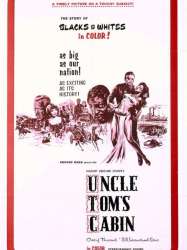
Uncle Tom's Cabin (1965)
, 2h5Directed by Géza von Radványi
Origin France
Genres Drama, Historical
Themes Films about slavery, Films about racism, Films about religion
Actors O.W. Fischer, Mylène Demongeot, Herbert Lom, Eleonora Rossi Drago, John Kitzmiller, Michaela May
Rating62%





Adaptation européenne du roman-fleuve d’Harriet Beecher Stowe contant la dramatique histoire d’une famille noire déchirée par l’esclavage dans le Sud des États-Unis avant la Guerre de Sécession.

Das Riesenrad (1961)
, 1h50Directed by Géza von Radványi
Origin German
Genres Drama, Comedy-drama
Themes Théâtre, Films based on plays
Actors Maria Schell, O.W. Fischer, Adrienne Gessner, Rudolf Forster, Doris Kirchner, Gusti Wolf
Rating61%





De l’empire austro-hongrois de la fin du XIX siècle jusqu’à sa chute au début du XX siècle, Elisabeth et Rudolf Hill (Maria Schell et O. W. Fischer), un couple aristocratique viennois, va connaître petits bonheurs et grands malheurs (Première Guerre mondiale et décès de leur fils) et être la proie des tentations qui guettent les êtres humains. Au-delà de leurs erreurs, les époux Hill resteront ensemble jusqu’au bout de leur « roue de la vie » telle l’immuable et festive Grande Roue du Prater de Vienne.
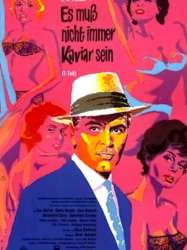
Operation Caviar (1961)
, 1h46Directed by Helmut Käutner, Géza von Radványi, Georg Marischka
Origin German
Genres War, Thriller, Comedy, Adventure
Themes Spy films
Actors O.W. Fischer, Eva Bartok, Senta Berger, Jean Richard, Geneviève Kervine, Viktor de Kowa
Rating58%





Thomas Lieven est un jeune employé de la banque Marlock & Lieven à Londres. Il est très intelligent et parle anglais, français et allemand. Il a aussi un penchant pour la cuisine et un faible pour le sexe féminin. Lorsque la Seconde Guerre mondiale éclate, il est pris malgré lui pour un espion dans le feu croisé des différentes agences de renseignement de Grande-Bretagne, France et Allemagne.

This Time it Must Be Caviar (1961)
, 1h38Directed by Helmut Käutner, Géza von Radványi, Georg Marischka
Origin German
Genres Thriller, Comedy, Adventure, Spy
Themes Spy films
Actors O.W. Fischer, Eva Bartok, Senta Berger, Jean Richard, Viktor de Kowa, Geneviève Kervine
Rating59%





Thomas Lieven vit une vie de banquier à Londres et séduit les dames avec ses talents culinaires. Mais il est poursuivi pendant la Seconde Guerre mondiale comme agent double et triple supposé des services secrets de la Grande-Bretagne, de la France et de l'Allemagne. Avec le colonel Siméon et l'agent française Mimi, il arrive à Toulouse où il reçoit l'ordre d'établir la liste des agents secrets français à Nice. Un courrier lui annoncerait son retour avec en Angleterre.
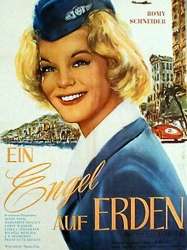
An Angel on Wheels (1959)
, 1h27Directed by Géza von Radványi
Origin German
Genres Comedy, Comedy-drama, Fantasy, Romance
Themes Films about religion, Films about angels
Actors Romy Schneider, Henri Vidal, Jean-Paul Belmondo, Margarete Haagen, Jean Brochard, Michèle Mercier
Rating55%





Un ange, déguisé en hôtesse de l'air, empêche le suicide d'un homme, qui veut passer à l'acte par désespoir amoureux.

Twelve Hours by the Clock (1959)
, 1h45Directed by Géza von Radványi
Origin France
Genres Drama, Thriller
Themes La provence
Actors Lino Ventura, Laurent Terzieff, Hannes Messemer, Eva Bartok, Lucien Raimbourg, Gert Fröbe
Rating60%





Trois évadés de prison ont douze heures devant eux, dans un port méridional en fête, pour trouver l'argent et les papiers nécessaires à leur embarquement.

The Doctor of Stalingrad (1958)
, 1h50Directed by Géza von Radványi
Origin German
Genres Drama, War, Romance
Themes Prison films, Political films
Actors O. E. Hasse, Eva Bartok, Hannes Messemer, Mario Adorf, Vera Tschechowa, Michael Ande
Rating62%





Revenu en Allemagne, après les années douloureuses d'internement dans un camp russe, le docteur Böhler, au moment où il remplit la fiche d'identité que lui tendent ses hôteliers, revit pendant un long moment les souvenirs marquants de sa captivité. Les prisonniers allemands sont soumis à des travaux épuisants en forêt, bien que sous-alimentés et très sommairement logés. Les malades et les épuisés se font trop nombreux, le règlement russe n'admettant pas plus de trois pour cent de malades, et le docteur Böhler doit lutter quotidiennement avec les autorités russes pour conserver à l'infirmerie des hommes incapables du moindre travail…
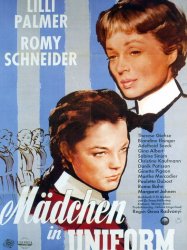
Girls in Uniform (1958)
, 1h35Directed by Géza von Radványi
Origin German
Genres Drama
Themes Films about education, Films about sexuality, Théâtre, LGBT-related films, Films based on plays, LGBT-related films, LGBT-related film, Lesbian-related films
Actors Lilli Palmer, Romy Schneider, Therese Giehse, Sabine Sinjen, Blandine Ebinger, Marthe Mercadier
Rating69%





In the early twentieth century, after the death of her mother, the young Manuela is admitted to a boarding school for girls where the headmistress imposes a rigid discipline. Manuela projects all her affection onto Miss Elisabeth von Bernburg, the only supervisor to show her any kindness. At boarding school, at a party where alcohol flows a little freely, Manuela creates a scandal by loudly proclaiming her love for Miss von Bernburg. Her later suicide attempt prompts the headmistress to review her methods while Elisabeth von Bernburg resigns.
 , 1h50
, 1h50Directed by Géza von Radványi
Origin German
Genres Comedy
Themes La mode
Actors Johanna Matz, Louis de Funès, Paul Hubschmid, Paul Edwin Roth, Erni Mangold, Franz Schafheitlin
Rating61%





Les conflits sentimentaux d'une demoiselle en fuite, qui exerce le métier de mannequin, courtisée par deux journalistes...

Mädchen ohne Grenzen (1955)
, 1h44Directed by Géza von Radványi
Origin German
Genres Drama, Romance
Actors Sonja Ziemann, Louis de Funès, Ginette Pigeon, Barbara Rütting, Ivan Desny
Rating56%





Helga, une hôtesse de l'air, rencontre un passager,Eriic, lors d'un vol vers Athènes. Ils tombent amoureux, mais il est marié. Plus tard, Helga est impliquée dans un accident de vol. L'un des passagers grièvement blessés est la femme d'Eric, Maria.
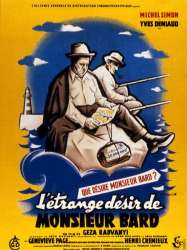
Strange Desire of Mr. Bard (1954)
, 1h47Directed by Géza von Radványi
Origin France
Genres Drama, Comedy
Actors Michel Simon, Louis de Funès, Yves Deniaud, Geneviève Page, Henri Crémieux, Paul Frankeur
Rating67%





Auguste Bard is a bus driver who lives alone because women don't find him attractive. He suffers with a heart condition and eventually he is told by his doctor that he has only a short time left to live. He decides to take an early retirement. Then he wins a huge amount of money at a casino and can afford to pay the professional dancer Donata to keep him company.
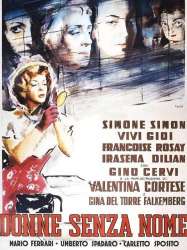
Women Without Names (1950)
, 1h40Directed by Géza von Radványi
Origin France
Genres Drama, War
Actors Simone Simon, Françoise Rosay, Valentina Cortese, Vivi Gioi, Lamberto Maggiorani, Gino Cervi
Rating64%





Après la fin de la Seconde Guerre mondiale, dans un camp italien de réfugiées, on assiste à la détresse de femmes sans-papiers en attente d’être rapatriées ou régularisées par des États volontaires. Il y a Yvonne la Française, prête à se marier avec le premier venu (un Albanais peu amène) pour quitter rapidement le camp, Anna la Yougoslave, impatiente d’accoucher pour retrouver un peu de son mari qui a été abattu sous ses yeux par l’ennemi, Janka la Polonaise qui a perdu la raison, rescapée d’un bordel allemand ; d’autres victimes comme elle vont retrouver dans le camp la doctoresse nazie qui les avait livrées en pâture aux officiers du front…

It Happened in Europe (1947)
, 1h44Directed by Géza von Radványi
Origin Hongrie
Genres Drama
Themes Films about children, L'enfance marginalisée
Actors Miklós Gábor, György Bárdy
Rating75%





1944. Quelque part au bord du Danube. Des enfants, victimes de drames terribles, surgissent d'un peu partout. Ils maraudent pour vivre et mènent une existence à moitié sauvage, craignant autant leurs semblables que les adultes... Ils forment, petit à petit, une bande de "pillards" régie par la loi du plus fort. Les paysans les chassent à coup de fusil, les forces de l'ordre essayent de les maîtriser. Afin de leur échapper, la bande de gosses finit par se réfugier dans un château habité par un chef d'orchestre retranché du monde... D'abord malmené, le musicien parviendra à gagner leur confiance.

The Talking Robe (1942)
Directed by Géza von Radványi
Genres Drama, Adventure, Historical
Actors Pál Jávor, Maria von Tasnady, György Kürthy, Gyula Csortos, József Juhász
Rating64%





 Connection
Connection
